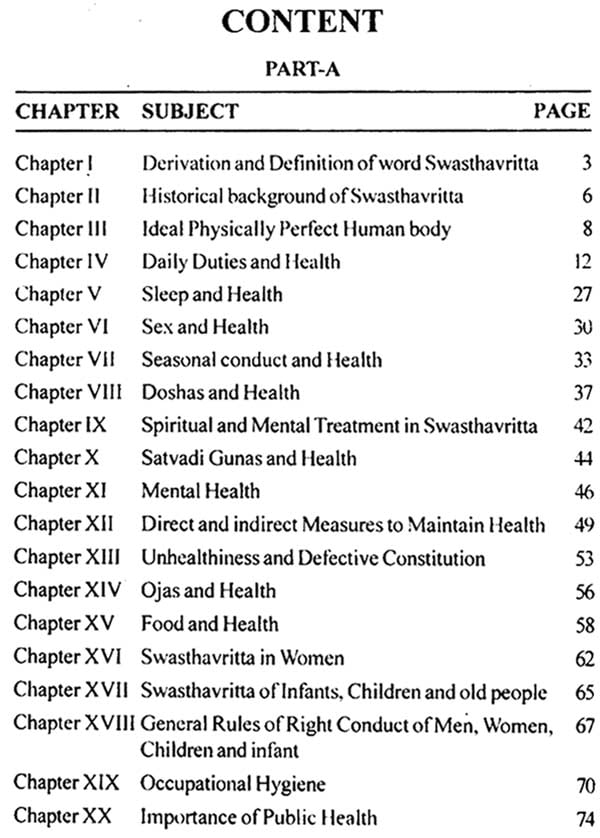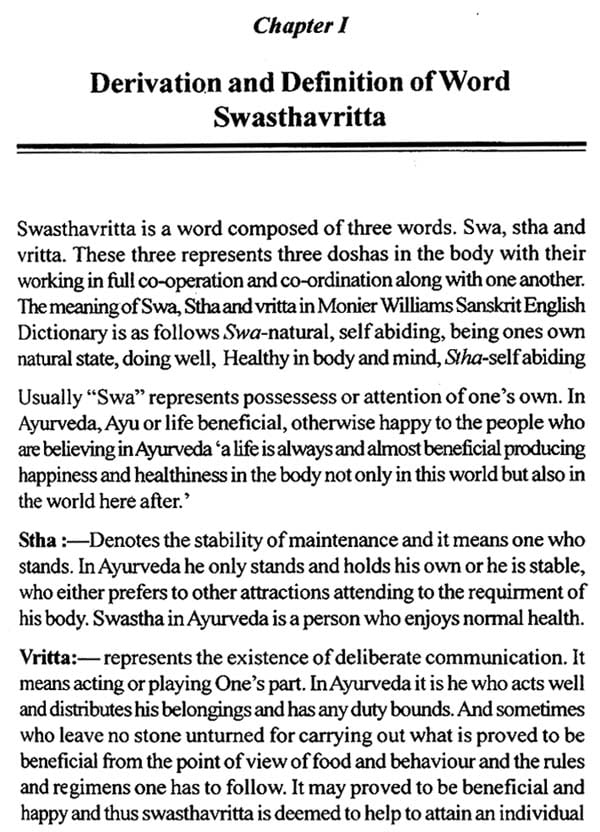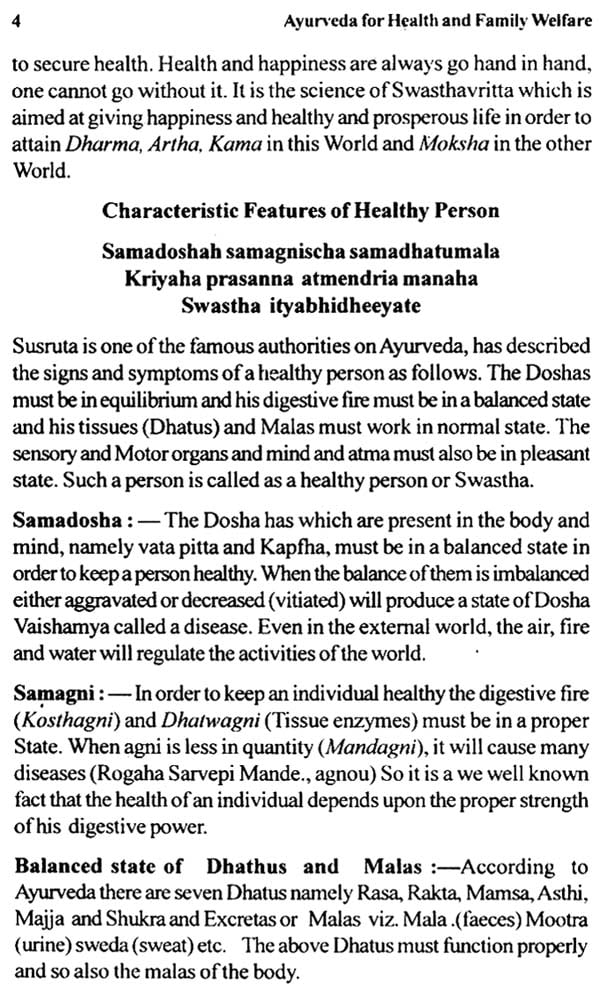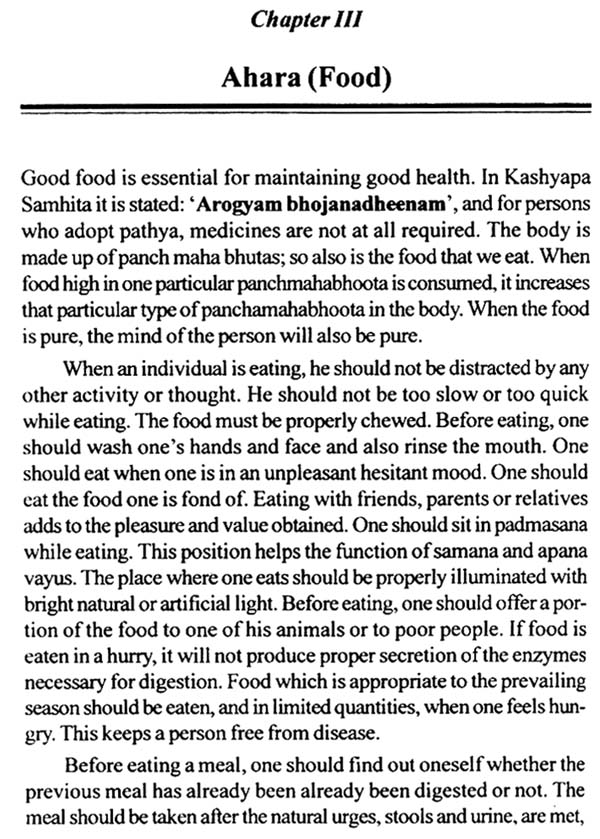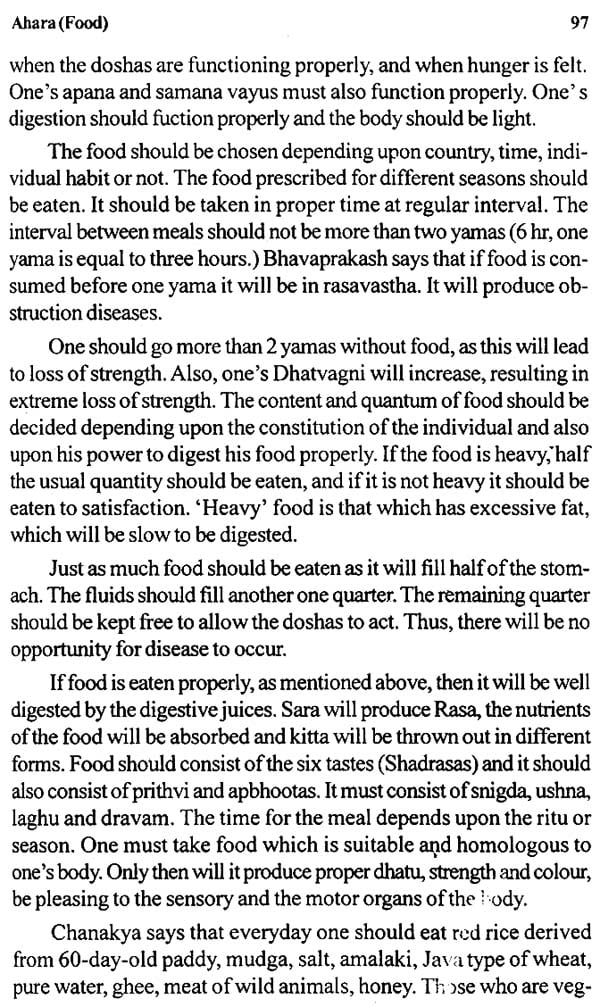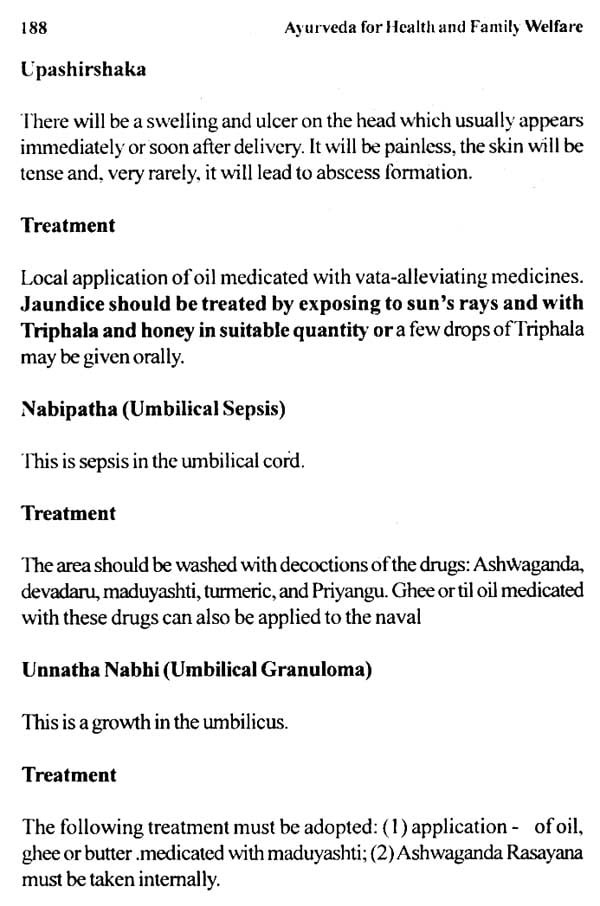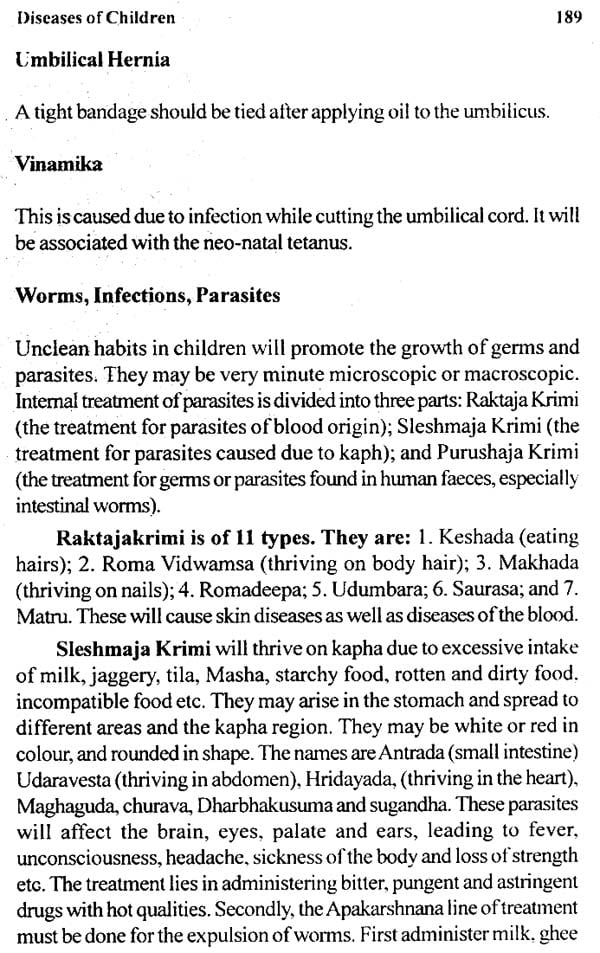
Ayurveda for Health and Family Welfare
Book Specification
| Item Code: | NAV278 |
| Author: | T.L. Devaraj |
| Publisher: | CHAUKHAMBHA ORIENTALIA, Delhi |
| Language: | English |
| Edition: | 2011 |
| ISBN: | 9788189469405 |
| Pages: | 263 |
| Cover: | HARDCOVER |
| Other Details | 9.00 X 6.00 inch |
| Weight | 400 gm |
Book Description
The book Ayurveda for Health and Family Welfare is the first book in the history of Ayurveda. There is a vivid description about maintenance of Health through Swastha Vritta, Dinacharya, Ritucharya, Brahmacharya, sleep, exercise and practice of Yoga. This book consists of 4 parts 1st part A deals with Swasthavritta which is essential to people in this so called civilized world to get their bodily and mentally ailments cured or atleast prevented.
Part-B : Deals with epidemic and endemic diseases and ways and means of their control.
Part-C Details about family from birth to menopause for women and to gents from child to old age.
Part-D : Exhaustively deals with family planning in ancient India more than five thousand years ago, the nirodh like sheaths were used and Vasectomy and operations are also advised. The spermicidal drugs are also used for contraception.
This books is written by an Ayurveda professor of repute will be useful to Health and Family Welfare department as well as Ayush Department.
The book "Health and Family Walfare in Ayurveda" contains 4 parts. Part "A' dealt with Daintenance of Physical health and mental health by observing daily habits (Dinacharya), Seasonal habits (Rutu charya). This part is also dealt with food health (Ahara and Arogya), occupational Hygiene (Vyava saya Swasthavritta) and military Hygienl (Sainikaswasthavritta).
Part ‘B’ consists of epidemic disesses, their cause, their preventive and curative measures etc.
Part 'C' describes menstrul Cycle, characteristic of pure and impure Shukra and Arthava, treatment of impura Shukra Arthava, development of Feotus, diseases of pregnancy, their management, normal and abnormal deliveries their management. Also causes Lakshanas and treatment of Streerogas and Balarogas have been mentioned in the book.
Part 'D' dealt with Family Planning in Ayurveda.
The author Dr. T.L. Devaraj, G.C.I.M., (Mys), D. Ay.M., (B.H.U). Professor, Goverment College of Indian Medicine. Bangalore is also author of Panchakarma treatment, Arogya and Kutumba Kalyana in Ayurveda and the book Manemaddu. He is well versed with the subject and has taken much pains to edit the book by collectiong several references. He has made an attempt to incorporate the modern ideas on the subject wherever it is necessary. Certainly this book would be more useful for the students as well as teacher and Practitioner of Ayurveda. The author has done a good Job by undertaking this book in English which is useful to the large Ayurveda population.
I pray Lord Dhanwantari to give his strength and happiness to publish more books in the field of Ayurveda.
Ayurveda is a science of life.lt aims at attaining the important four goals of life i.e. four purusarthas. They are Dhanna Artha, Kama and Moksha (service to society, service to family, service to self and attain-ment of Godhood).
If one wants to secure the way of self realisation and Salvation by means of correct living, they must follow the rules of Health. Danta Dhavana (cleaning of teeth), Jihva Nirlekha (cleaning of tongue), Tambulasevanam(eating ofBetel leaves), Udvarthanam (wickrelling), Mukha lepam (beauty cream for face), Cham kramana (walking) Samvahanam (massage), Sukhavatam (good breeze), Atapam (sun-light), snanam (bath),Anulepanam (Unguentum), Vegadharanam (Calls of nature), Sadvrittam (good conduct), Sadacharam (general priniciples of right conduct) and Balanced Diet.
Health is considered as the perfect condition of the whole man who is having a happy combination of thought, action and speech and his mind must be under the control of Atma, with its clear, intellect. He must be devoted to authorities and spiritual practices; such an individual will never be subjected for any diseases. When a person behaves equally towards the other living creatures, devoted to truth, who is forgiving others, who services the wise people with humility such a person will never be subjected for any diseases. The main aim of Ayurvedic treatment is to make the healthy persons feel more vigorous and destroy the diseases.
Ayurveda, the science of health, advocates the prevention of diseases rather than of curing it. Ayurveda is not only meant for welfare of an individual during life but also in the world beyond. It advocates the control of maintaining doshas in equilibrium. Hygiene is a science of life which describes the theory and practical of maintaining and fulfil to a great extent. The purpose of Modem Hygiene. The living human body is called 'Purusha in Ayurveda and he is composed of five things. Health, Happiness, Rest, Recoupment and Longings. When he is healthy then only he will be able to resist hunger, exhaustion, disease, displacement and heat.
This book is divided into four parts.
Part-A- Swastavrutta and its importance.
Part-B- Janapadadwamsa Rogas and their remedies (Epidemic and Endemic Disease and their remedies)
Part-C- Kutumba Kalyana (Family Welfare
Part-D- KutumbaYojane (Family Planning)
It may be noted here that even in olden days there is a vivid description about Health; and its maintenance, prevention of epidemic andendemic disease. The proper welfare of the family and more so about Family Planning. Ayurveda postulates many methods for pre-venting conception about use of metallic Condoms, which are either perforated or imperforated. The imperforated one is meant for pre-venting conception. There are several oral contraceptives for females as well as for males. Spermicidal drugs have been used by man to prevent conception effectively. This book is the first of its kind on Health and Family Welfare in Ayurveda in English. Original works on Ayurveda viz. Charaka, Susrutha and Vagbahat and their authoritative commentaries etc. are consulted. So the author is highly indebted to all the Authors and Publishers of the books mentioned in the Bibliograpy.
The Purpose of writing these books is not only to throw light on Ayurvedic ideas about Health, but also to project the ideas of Family Welfare and Family Planning measures as described in Ayurveda, which were and are practised in India with resounding benefit not only during ancient times but also even today.
This book has been published in Kannada language and it has been recommended as a book not only useful for students of Medicine who are studying at college and university levels but also to the general public. So also this book.
I hope this book will serve as a standard book on Health and Family Welfare in Ayurveda and it directly or indirectly helps in programmes of Health and Family Welfare of our people not only of India but also of the world.
The book will also be useful to the students of B.A.M.S. first year, second year, third year and fourth year as it contains Swasthavritta, Striroga. Prasootitantra ,Kaumarabhritya and Kutdmba Niyantrana and Kutumbhakalyana etc.
I hope the readers will receive this book with the same zeal and enthusiasm as they had received my previous books on Ayurveda.
**Contents and Sample Pages**
